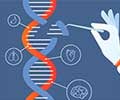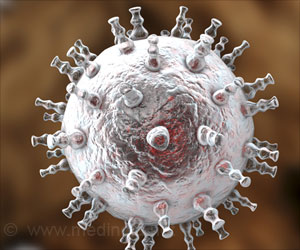The CRISPR/Cas9 system is used to alter chimeric antigen receptor T cells which will increase tumor rejection in the host.
- A method of improving the potency of T cells against cancer was developed by a research team from Memorial Sloan Kettering Cancer Center.
- The chimeric antigen receptor T cells were altered using the CRISPR/Cas9 system
- The immune response mediated by the T cells aided in better tumor rejection
The Director of the Center for Cell Engineering and ‘the Gene Transfer and Gene Expression Laboratory’ at MSK, Dr. Michel Sadelain, who is the senior author of the study said that cancer cells evade treatment through various mechanisms and that there was a need for CAR T cells to overpower them. The current study provides support to the theory that these genome editing tools may be used to develop 'living therapies' that boost treatment for cancer. The scientists’ claim that they are ‘eager’ to identify how such genome-editing technology could be used to develop the next generation of CAR T cell therapy.
Clinical Trials of CRISPR
The clinical trials that use CRISPR are in the initial stages of planning but Dr. Sadelain and his colleagues state that work is on to identify the safety in using CRISPR for developing altered CAR T cell. The current method of delivering CAR gene into T cells is by using lentiviral or retroviral technology. This gene editing tool can be used to deliver the CAR gene at random locations on the genome, which is a limitation as it can lead to unnecessary mutations.CRISPR
CRISPR is short for Clustered Regularly Interspaced Short Palindromic Repeat. It is a unique arrangement of short, semi-palindromic repeated DNA sequences that are present in micro-oganisms like bacteria. Though they seem innocuous, these sequences of DNA are a vital part of the immune system.Bacterial cells are affected by infectious viruses that invade the bacterial genome. However, the host cells have developed a defense mechanism where the CRISPR/Cas9 system splices the viral genome. The host cell, therefore, is protected from a viral infection.
In between these CRISPR sequences are certain sequences of DNA that are called spacers, which are where the ‘memory’ of the viral DNA that entered the bacterial cell is stored. Any repeat attack by the same type of virus will elicit a faster response by the CRISPR system.
CRISPR used for HIV Treatment
Studies conducted using CRISPR identified a key gene in the cell, called C-C chemokine receptor type 5, which was important for binding the HIV to T cells. When inhibitors for this gene were utilized, it led to side effects.- TPST2 (Tyrosylprotein Sulfotransferase 2)
- SLC35B2 (Solute Carrier Family 35 Member B2)
First Human Trial of CRISPR Cas 9 system
The CRISPR/Cas9 system was trialed for the first time on critical lung cancer patients. The immune cell of the patients were isolated and treated with the CRISPR/Cas9 system, where genes that code for the protein PD-1 were silenced. The initial findings of the study pointed towards control over the spread of cancer. Though this human trial was conducted on patients at advanced stage of the disease and where there were no further treatment options that were available, it could soon be adopted as an earlier line of protection.The current study that focuses on increasing the cancer fighting ability of T cells using the CRISPR/Cas9 system promises better immunotherapy against cancer. The body’s own immune cells will be strengthened to fight against the tumor growth, which could limit side effects associated with regular cancer therapy.
References:
- What is CRISPR? - (http://sitn.hms.harvard.edu/flash/2014/crispr-a-game-changing-genetic-engineering-technique/)
Source-Medindia













